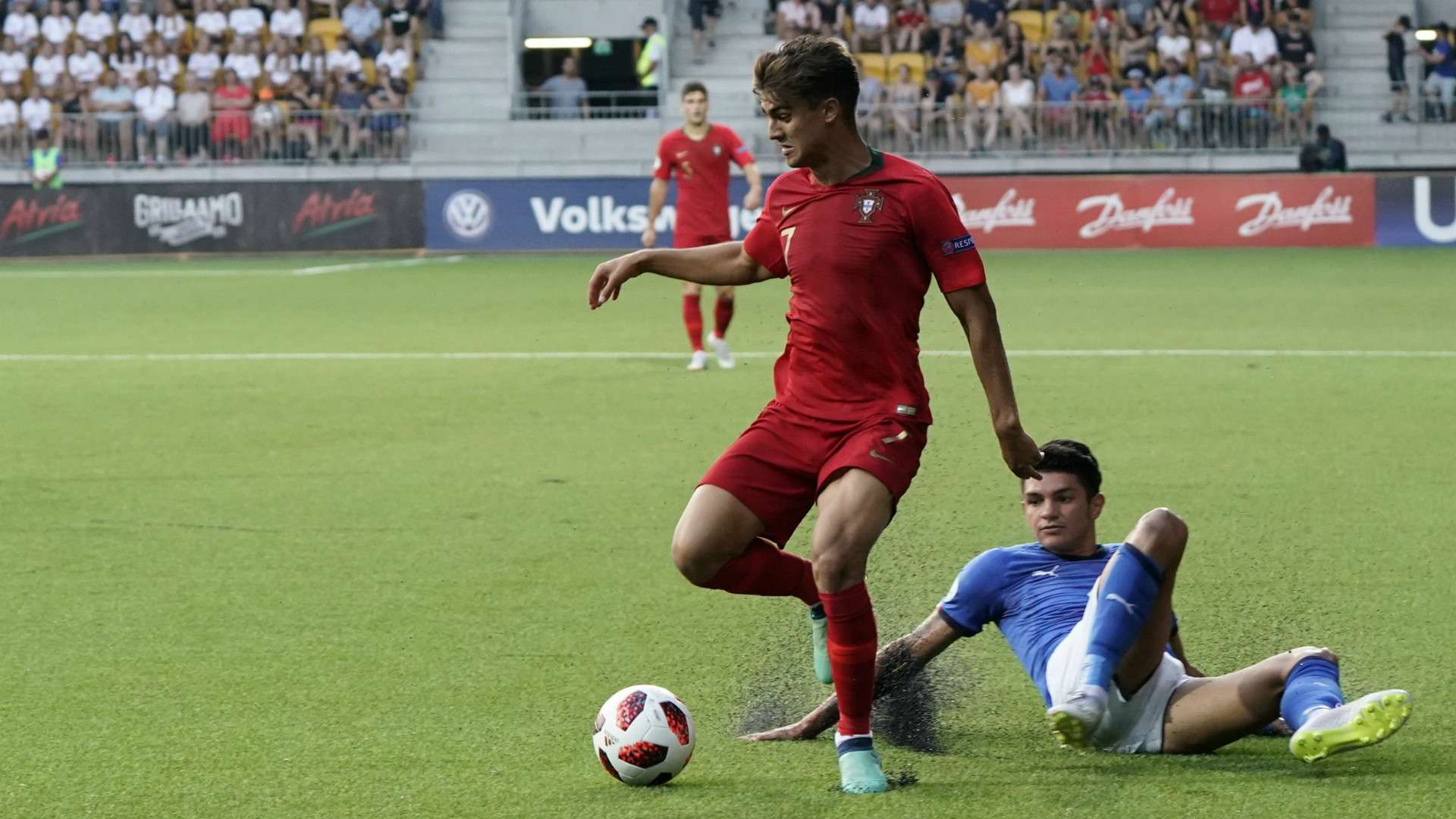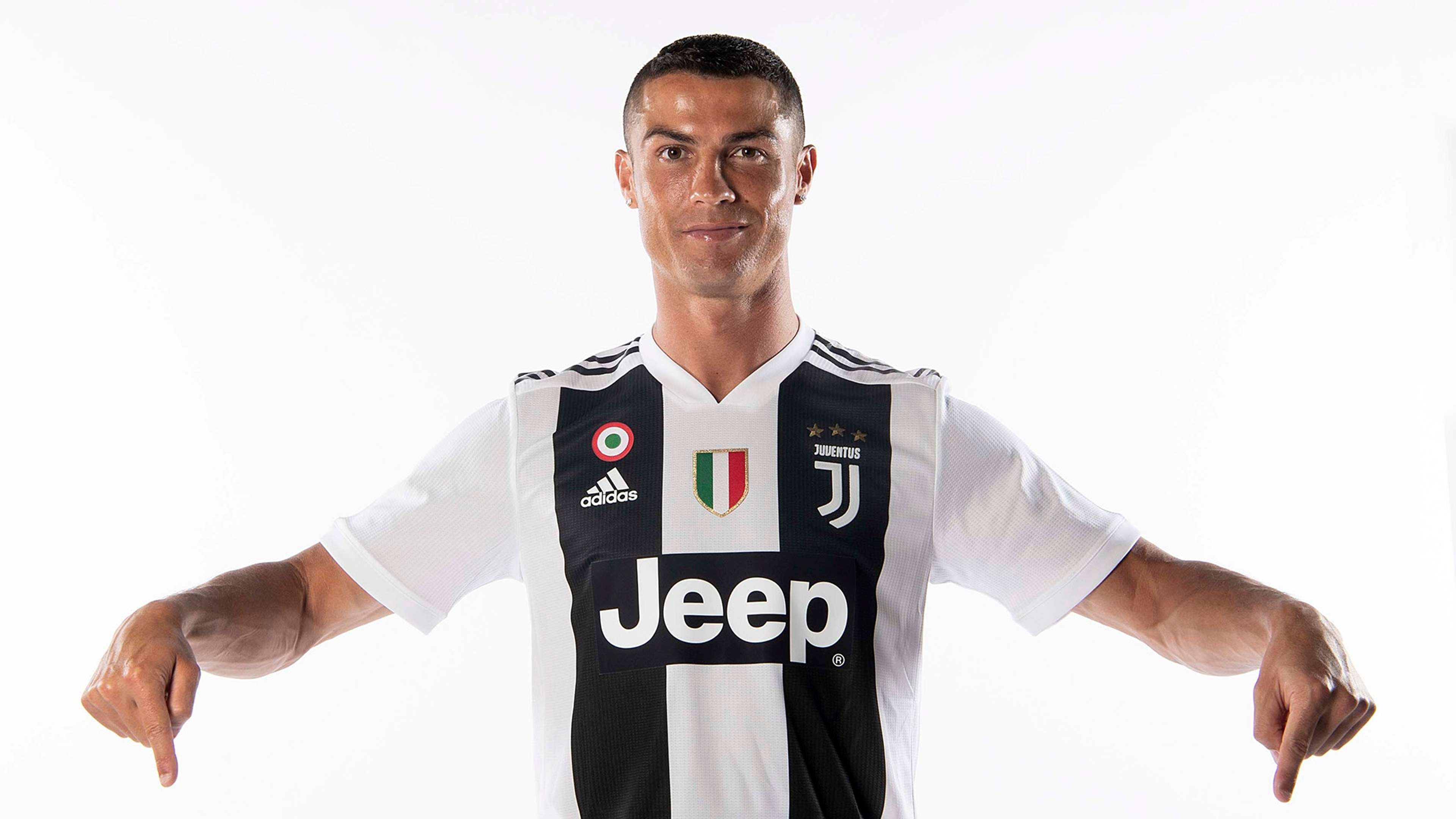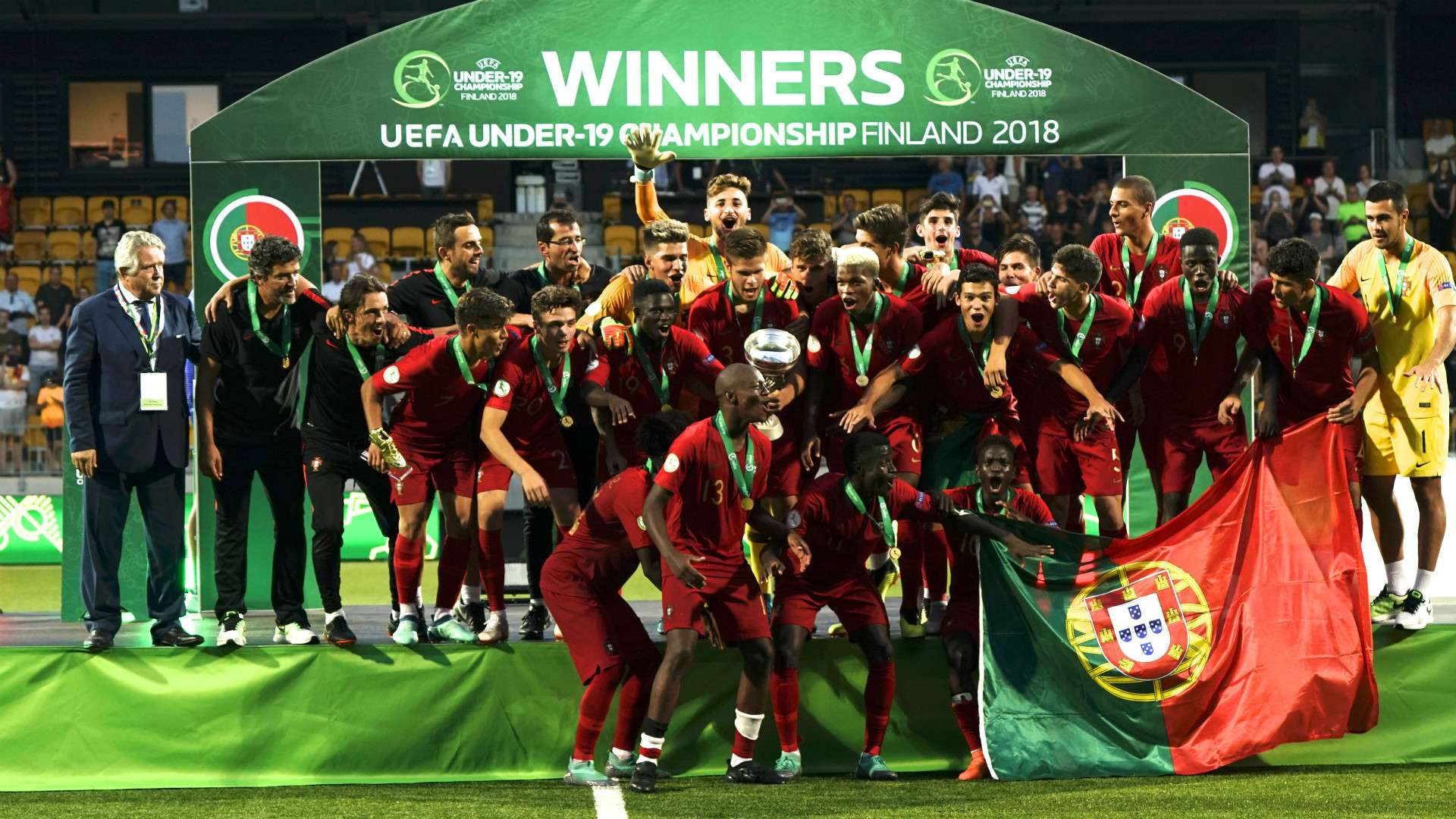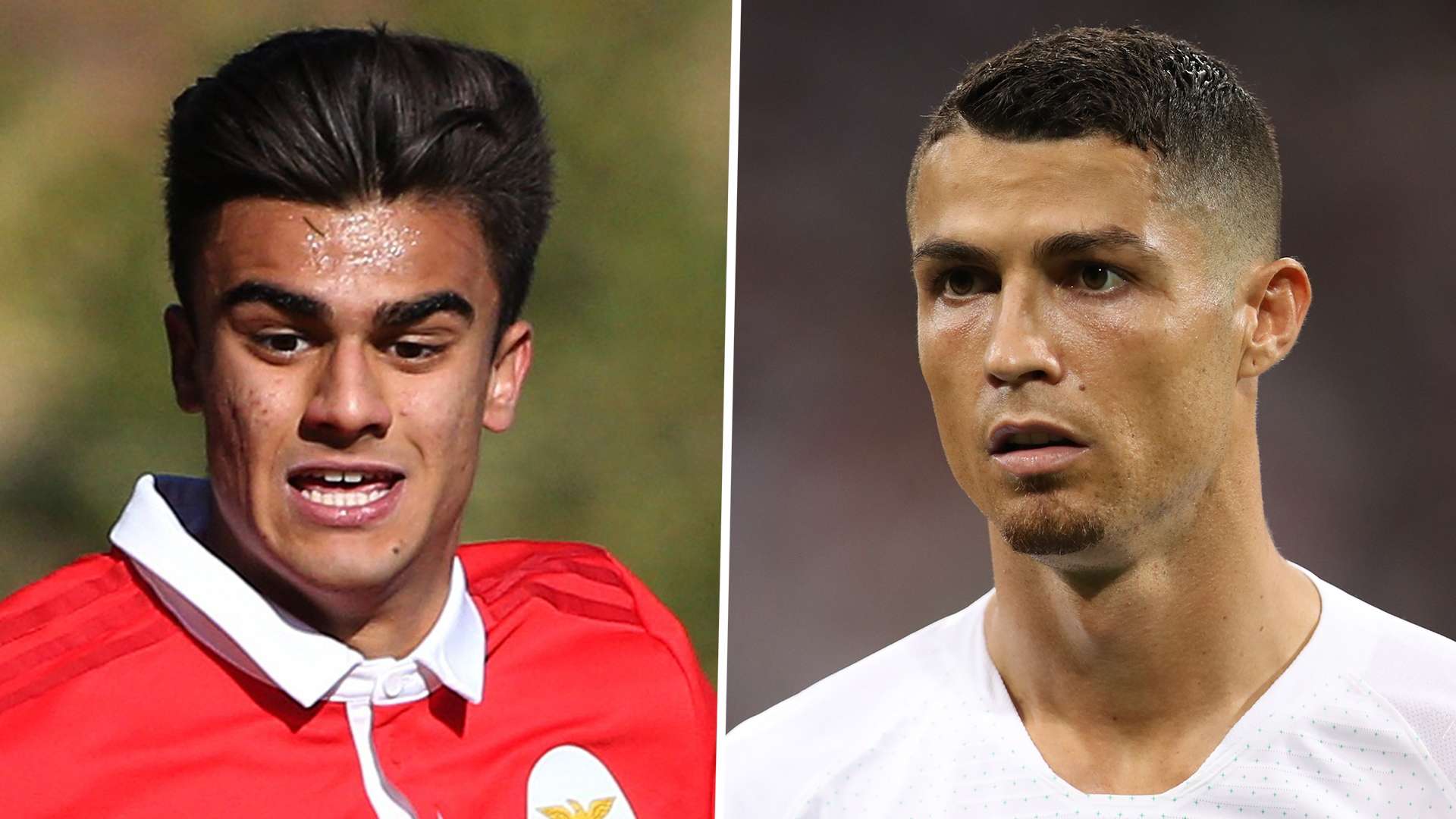As referee Juan Martinez Munuera whistled for full-time on Sunday in Helsinki after a 120 minute footballing epic, it was impossible not to feel that life had come full circle for Portugal’s Under-19 heroes.
The Iberians had just defeated Italy in a thrilling seven-goal classic in the European Championship final and, in doing so, this generation completed an unprecedented double having lifted the U-17 Euros two years earlier.
A lot can be written about the Portugal team’s success story in Finland, which came just one year after the squad had finished runners-up to England in Georgia.
Led by Helio Sousa - who was part of the 1989 FIFA U-20 World Cup-winning side featuring Paulo Sousa, Joao Pinto and Fernando Couto - the team ended the tournament with the best attack. They plundered 17 goals in just five games - seven more than runners-up Italy - and had the second-highest average attempts per game (16.8).
But there was a lot more to their victory than just attacking prowess. The players also displayed incredible mental fortitude until the very end, keeping their composure even when Italy striker Moise Kean’s two-minute double salvo late in the second half unlocked a final that seemed to be under control by the Portuguese side as they led 2-0.
With three final appearances and two titles in just three years, the squad has inevitably been named the ‘new golden generation’ of Portuguese football, headlined by two standout stars; Joao Filipe (pictured below) - also known as Jota - and Francisco Trincao.
The two wingers were a joy to watch throughout the finals and finished joint top-scorers with five goals apiece. Jota, who plies his trade for Benfica, constantly bamboozled defenders with his technique, speed and incisiveness.
Meanwhile, Braga’s Trincao raised eyebrows mostly for his strength and ability in the air, though it must also be noted that he averaged 2.7 key passes per 90 minutes and boasted a 58% dribble success rate.
 Getty
Getty

And as fate would have it, the pair’s pasts are in a way intertwined as they both struggled to make it during their early formative years. Jota underwent a trial at Manchester United at the age of 15 together with then Benfica teammate Joao Virginia but failed to impress, while a 10-year-old Trincao spent just a few months at Porto before being sent back to hometown club Vianense.
There are a few other starlets from Portugal’s campaign that every football fan should be monitoring closely in years to come. Goalkeeping duo Diogo Costa and Joao Virginia both did very well between the sticks, adding their names to a list of possible heirs to Rui Patricio that includes Manchester United’s Joel Pereira and Atletico Madrid’s Andre Moreira. Full-back Ruben Vinagre excelled with his speed and crossing ability, forming a lethal combination with Jota on the left flank of the pitch.
Holding midfielder Florentino, who has over 60 international caps at youth level, impressed with his industrious running and tireless work-rate, while West Ham’s Domingos Quina, who has been playing in England since the age of 13, was commended by fans and pundits for his physical presence in midfield, his vision and passing ability. And although Jose Gomes only made the net ripple once, having been top scorer at the Euro U-17 finals in 2016 with seven goals, the Benfica striker was nonetheless a constant threat, using his strength to hold off defenders and bring the wingers into play.
Such is Portugal’s strength in depth at youth level currently that a handful of highly-rated players did not even make the cut for Helio Sousa’s squad. These include Diogo Dalot, who recently joined Manchester United in a deal worth €22 million, as well as the likes of Diogo Leite, Rafael Leao, Joao Felix and Gedson Fernandes – all of whom have been making waves in Portugal.
As Helio Sousa begins his preparations for next year’s Under-20 World Cup, he can only be happy with the abundance of talent at his disposal.
“We also have to thank the clubs for investing in infrastructures and human resources to help us to develop our young players,” the coach said after the tournament. “We have been an ideal partner when it comes to developing potential.”
 Getty
Getty
As Cristiano Ronaldo enters the final stage of his career, many wonder whether Portugal will be able to find a worthy successor to the new Juventus superstar. Jota has often been labelled ‘the next Cristiano Ronaldo’ and his performances at the Under-19 European Championship will only fuel such comparisons.
However, talent alone is never enough in order to become a superstar. As well as hard work and a bit of luck, Portugal’s youngsters need to be afforded the chance at club level to develop. This is something that hasn’t happened enough in recent years as playing chances have been extremely limited.
As reports begin to link Juventus with Trincao, it is natural to fear that were he to make the move to such a big club, the 18-year-old would add his name to the list of promising players who went abroad too soon and disappeared.
Eight years have passed since Portugal finished in second place at the FIFA U-20 World Cup. Tournament winners Brazil nurtured many players who would go on to become global stars, including Philippe Coutinho, Oscar, Casemiro, Danilo and Alex Sandro.
For the Portugal side from that tournament, however, the dream of becoming a top-flight player only materialized for some. Big things were expected of Pele and Julio Alves, while even Nelson Oliveira, believed to be one of the most gifted talents of his generation, is now competing in the second tier of English football after failing to make his mark at Benfica.
For most of the players in the current Under-19 side, 2018-19 will be their first full season at senior level. Trincao has been promoted to Braga’s main squad, while Jota is expected to spend the campaign in Benfica’s B side - competing in the second division – having spent a portion of last season playing in the Under-19 team.
Some of the members of the Portugal Under-19 squad may not be able to reach the greatest of heights but, for others, Sunday’s victory could merely be the start of an incredible journey. Now it is all about giving these young players the opportunities they need to grow and improve. If not, we will see just another generation of wasted potential.
